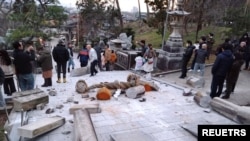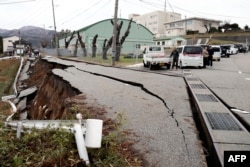The death toll is rising in western Japan following a powerful earthquake that struck the region Monday afternoon.
Japan’s Kyodo news agency is reporting at least 24 people were killed in the 7.6 magnitude quake, with Ishikawa prefecture sustaining the worst of the disaster.
Japanese officials said they had reports of at least 19 dead, but have not issued updated casualty figures.
Dozens of homes and buildings were flattened, with an unknown number of people trapped in the rubble. Roads have been split in pieces, and a runway at least one regional airport had cracked, making it difficult for emergency officials to assess the damage.
Japanese Prime Minister Fumio Kishida said Tuesday during a meeting with government disaster officials that search and rescue crews are waging “a battle against time” to save any victims who remain trapped in the rubble in Ishikawa prefecture.
About 1,000 members of the Japanese Self-Defense Forces have been dispatched to the disaster zones.
A fire broke out in the city of Wajima, Ishikawa Prefecture, and more than 30,0000 households remain without electricity.
U.S. President Joe Biden said the United States would provide any necessary assistance it could.
"As close allies, the United States and Japan share a deep bond of friendship that unites our people. Our thoughts are with the Japanese people during this difficult time," he said in a statement.
The Japanese Meteorological Agency lifted all tsunami warnings for the western region by early Tuesday morning. The agency initially issued a major tsunami warning for Ishikawa and lower-level tsunami warnings or advisories for the rest of the western coast of Honshu, as well as the northernmost of its main islands, Hokkaido.
The agency is warning that strong aftershocks could strike the same area over the next few days.
Japanese media footage showed people running through the streets and red smoke spewing from a fire in a residential neighborhood.
The earthquake struck off the coast of Ishikawa and was followed by at least 20 aftershocks in the following hours, with many of them at least a magnitude 5.
The meteorological agency reported a tsunami of 1.2 meters hit the port of Wajima, with smaller tsunami waves hitting areas to the north and south.
A government spokesperson said there were no reported irregularities at any of the nuclear power plants near the epicenter.
Authorities closed some major highways near the epicenter, and bullet train services between Tokyo and Ishikawa were suspended for hours, although some service in the earthquake region was restored Monday evening.
Some information for this report came from The Associated Press, Agence France-Presse and Reuters.






